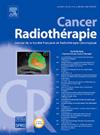Real-world evidence for preoperative use of (chemo)radiotherapy with intensity modulation for locally advanced rectal cancer by the Colib French group
IF 1.4
4区 医学
Q4 ONCOLOGY
引用次数: 0
Abstract
Purpose
The acute toxicity of chemoradiotherapy can cause treatment interruptions and diminish patient quality of life. Recently, intensity-modulated radiotherapy has been shown to delineate treatment areas more precisely, thereby sparing unnecessary radiation exposure to organs at risk. However, the French national health authority does not currently recommend intensity-modulated radiotherapy for rectal cancer. This study aims to provide real-world data to evaluate the effectiveness of (chemo)radiotherapy with intensity modulation in the preoperative treatment of locally advanced rectal cancer.
Materials and methods
This retrospective study was conducted in a private practice setting in France. Patients included had confirmed, locally advanced rectal adenocarcinoma and had received neoadjuvant (chemo)radiotherapy with intensity modulation followed by surgery.
Results
A total of 700 patients underwent (chemo)radiotherapy with intensity modulation for a median duration of 6 weeks, most frequently using 45 to 50.4 Gy. Thirty-seven patients had local disease progression, 98 experienced distant disease relapse, and 39 patients died during the follow-up period. Severe toxicity occurred in 5 % of patients (n = 37), which was lower than the toxicity rates reported in previous studies with conformal radiotherapy. Small bowel V40 was identified as a predictive factor. Downstaging T (0.572, 95 % confidence interval [95 % CI]: 0.372–0.880, P < 0.0110), downstaging N (0.522, 95 % CI: 0.332–0.820, P < 0.0048), pathological complete response rate (0.4432, 95 % CI: 0.218–0.854, P < 0.0158), and no abdominal surgery (0.541, 95 % CI: 0.360–0.812, P < 0.0077) were found to be predictive for survival.
Conclusions
Neoadjuvant (chemo)radiotherapy with intensity modulation was found to reduce the incidence of acute gastrointestinal toxicity events compared to conformal radiotherapy, without compromising efficacy in patients with locally advanced rectal cancer.
Colib French组对局部晚期直肠癌术前使用调强化疗放疗的真实证据
目的放化疗的急性毒性可导致治疗中断,降低患者的生活质量。最近,调强放疗已被证明可以更精确地划定治疗区域,从而避免对有危险的器官进行不必要的辐射照射。然而,法国国家卫生当局目前不推荐调强放疗治疗直肠癌。本研究旨在提供真实世界的数据来评估(化疗)放疗强度调节在局部晚期直肠癌术前治疗中的有效性。材料和方法本回顾性研究在法国的一家私人诊所进行。纳入的患者已确诊为局部晚期直肠腺癌,并接受了新辅助(化疗)放疗和强度调节,随后进行手术。结果共700例患者接受了强度调节(化疗)放疗,中位时间为6周,最常见的剂量为45 ~ 50.4 Gy。37例局部疾病进展,98例远处疾病复发,随访期间死亡39例。5%的患者(n = 37)出现严重毒性,低于以往适形放疗研究报道的毒性率。小肠V40被确定为预测因素。降期T(0.572, 95%可信区间[95% CI]: 0.372-0.880, P <;0.0110),降期N (0.522, 95% CI: 0.332-0.820, P <;0.0048),病理完全缓解率(0.4432,95% CI: 0.218-0.854, P <;0.0158),无腹部手术(0.541,95% CI: 0.360-0.812, P <;0.0077)可以预测生存率。结论与适形放疗相比,调强辅助化疗可降低急性胃肠道毒性事件的发生率,且不影响局部晚期直肠癌患者的疗效。
本文章由计算机程序翻译,如有差异,请以英文原文为准。
求助全文
约1分钟内获得全文
求助全文
来源期刊

Cancer Radiotherapie
医学-核医学
CiteScore
2.20
自引率
23.10%
发文量
129
审稿时长
63 days
期刊介绍:
Cancer/radiothérapie se veut d''abord et avant tout un organe francophone de publication des travaux de recherche en radiothérapie. La revue a pour objectif de diffuser les informations majeures sur les travaux de recherche en cancérologie et tout ce qui touche de près ou de loin au traitement du cancer par les radiations : technologie, radiophysique, radiobiologie et radiothérapie clinique.
 求助内容:
求助内容: 应助结果提醒方式:
应助结果提醒方式:


